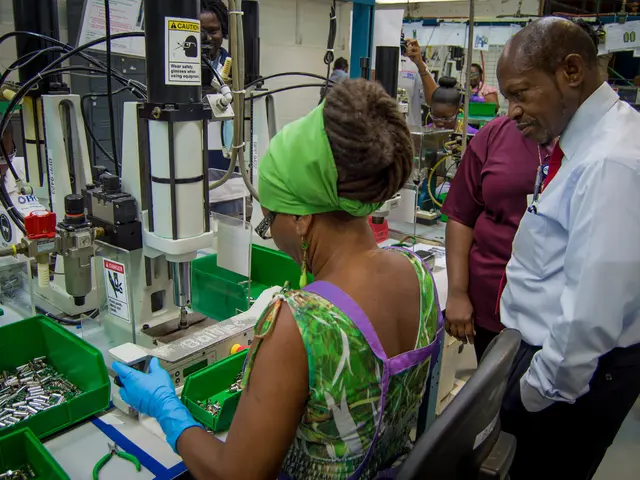The AI-Enhanced OR: A Game Changer for Surgical Efficiency
AI Bolstering Hospital Surgical Theatres' Efficiency
Hospitals are on a mission to streamline surgical operations, acknowledging that delays can have detrimental impacts on patient outcomes, satisfaction, and costs. Kathleen Ulrich, senior vice president of perioperative services at Tampa General Hospital, Florida, succinctly puts it, "Nobody wants to hear they'll have to wait for a procedure because there's a packed surgical schedule."
In a bid to minimize such delays, Tampa General Hospital launched a new surgical operations system in 28 out of 52 operating rooms (ORs) in summer 2024. Utilizing cameras and artificial intelligence (AI), the platform offers invaluable real-time insights that surgical teams can leverage to forecast key metrics such as case durations and turnover times, enhancing scheduling precision.
Previously, the hospital could only rely on data derived from manually entered time stamps from electronic health records, a method that was time-consuming and error-prone. Now, automated and comprehensive data capture which includes "wheels in to wheels out to wheels in again" ensures a more accurate representation of surgical processes for informed scheduling decisions.
"With this tool," Ulrich explains, "we can now provide a more realistic time estimate for each procedure based on the surgeon's case history, allowing us to customize the daily schedule accordingly."
The new system is helping Tampa General save approximately 3,000 minutes per week, a considerable chunk of time previously lost to surgical inefficiencies. The innovative technology has the potential to facilitate the scheduling of over 600 procedures in the hospital's first year, as resources are optimized better than ever before. And that, Ulrich is quick to note, translates to more patients receiving the care they need.
AI-Driven Surgery Scheduling: A Promising Trend
AI promises to streamline surgery scheduling and operations in hospitals throughout the United States. A 2024 Philips report reveals that 84% of U.S. healthcare leaders believe that automation can save their workers time by reducing daily administrative tasks, while 76% believe it will allow care teams to perform at their highest skill levels.
Efficiency, compliance with standard safety procedures, and drive for improving care quality are top concerns in operating rooms, according to Dr. Teodor Grantcharov, a professor of surgery at Stanford University and associate chief quality officer for innovation and safety at Stanford Health Care. AI is now being harnessed for these purposes, and more, he asserts.
In Northern California, MarinHealth Medical Center has already dug deep into the benefits of AI in the OR. Vascular surgeon Dr. Allan Conway uses an AI-based anatomy-mapping technology for aortic aneurysm repair, which takes data from a patient's preoperative CT scans and deploys AI to develop precise 3D images of affected blood vessels. The system also provides physiological and anatomical change analyses critical for clinical decision-making.
AI Transforming ORs Beyond Scheduling
Banner Health, a leading nonprofit health system in the U.S., is another institution embracing the benefits of AI. The organization is using AI to optimize OR scheduling and operations, paving the way for improved patient outcomes.
"We wanted to enhance the ability of patients and doctors to use our available resources," says Dr. Nirav Patel, Banner Health's medical director of surgical and procedural services. The organization is focusing on surgical "block times," or the consecutive hours on any given day that ORs are reserved for single surgeons, with the primary aim of improving both patient access and surgeon efficiency.
To achieve this, Banner Health is leveraging an operations automation solution that uses AI and machine learning to analyze surgical data and trends, providing up-to-the-minute scheduling predictions, making it easy to plan OR availability. The innovation is taking root in hospital after hospital, as AI adoption continues to gather momentum.
In reviewing AI-powered surgery innovations, the journey towards a more efficient healthcare landscape is becoming clear. From real-time surgical insights to the automation of scheduling and operations, AI is set to transform the OR, driving better use of resources and improving patient care.
- The application of AI in surgery is not limited to scheduling; it is also being used to create precise 3D images of affected blood vessels in the OR, as demonstrated by MarinHealth Medical Center's use of AI-based anatomy-mapping technology for aortic aneurysm repair.
- The use of AI is expanding beyond scheduling in healthcare institutions such as Banner Health, where AI and machine learning are employed to analyze surgical data and trends, offering up-to-the-minute scheduling predictions and resources optimization, contributing to improved patient outcomes and surgeon efficiency.








